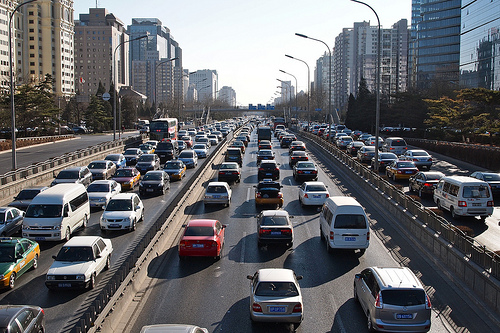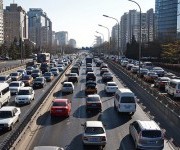 Photo: Remko TanisCross-posted from Climate Progress.
Photo: Remko TanisCross-posted from Climate Progress.
Driven by demand from countries like China, India, and Brazil, the global market for automobiles is accelerating faster than ever. According to an analysis from the auto trade journal Ward’s, there are now over one billion cars, light-, medium-, and heavy-duty trucks on roads around the world, up from 980 million at the end of 2009.
In just half a year, the global auto fleet expanded by around 35 million vehicles. That’s the second-biggest increase ever.
The U.S. is still has the biggest population of cars and trucks — one for every 1.3 people in the country. But the American fleet is not growing much, only about 1 percent a year. The explosion in automobile deployments is coming from China, where registrations grew by 27.5 percent, bringing the country’s vehicle population to 78 million. That increase was more than half of the total global expansion, according to Ward’s:
The leap in registrations gave China the world’s second-largest vehicle population, pushing it ahead of Japan, with 73.9 million units, for the first time.
India’s vehicle population underwent the second-largest growth rate, up 8.9 percent to 20.8 million units, compared with 19.1 million in 2009.
Brazil experienced the second-largest volume increase after China, with 2.5 million additional vehicle registrations in 2010.
China put 16.8 million vehicles on the road in 2010. Industry analysts were forecasting another 15 percent jump in sales in 2011, but the market slumped after the government stopped providing subsidies for car buyers in order to temper the market. Even so, China’s vehicle population could surpass America’s in just a few years.
According to the International Transport Forum [PDF], the global vehicle fleet could reach 2.5 billion by 2050. No doubt those cars and trucks will be much more efficient than today’s vehicles, especially with China and America setting tighter fuel standards. And many of them will be electric-drive vehicles. But another doubling of the global market — even with an increase in efficiency — means massive increases in greenhouse-gas emissions.
Auto industry executives everywhere are giddy with joy; meanwhile, those concerned about climate change wonder if we have the wisdom to take our foot off the fossil-fuel accelerator.



